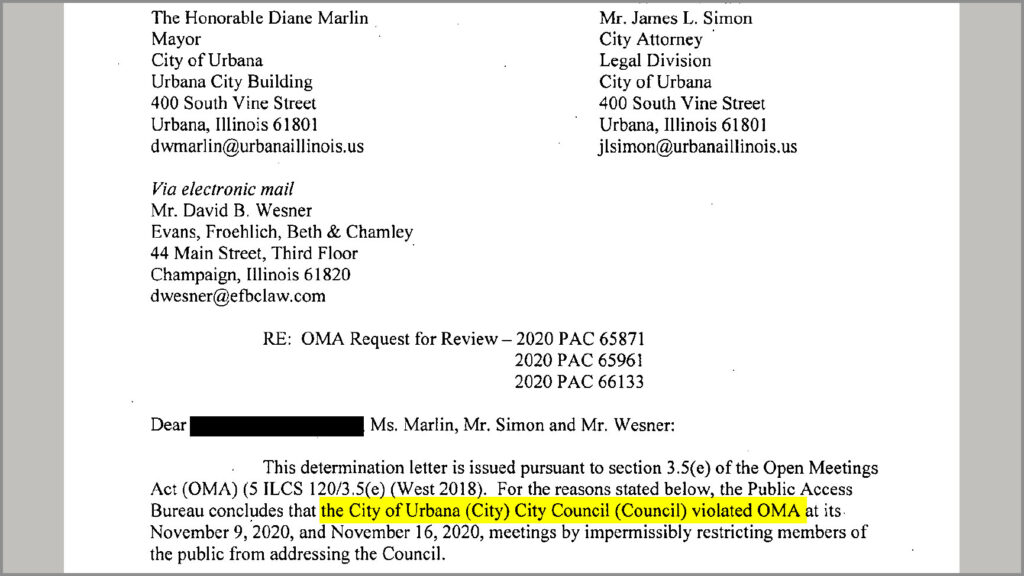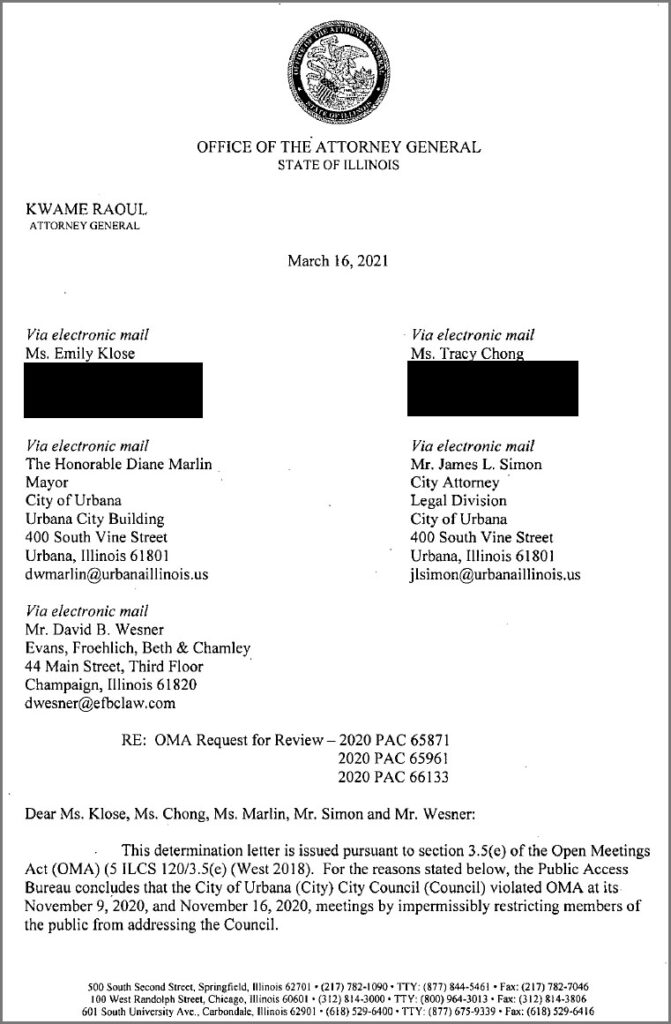
The Illinois Attorney General has issued a determination against the City of Urbana in regards to three Open Meetings Act complaints submitted to the Public Access Counselor (PAC) late last year. According to the PAC, Mayor Diane Marlin and the Urbana City Council violated the Illinois Open Meetings Act at its November 9th and 16th meetings by interrupting and muting residents who criticized City officials during public input.
The determination by the Attorney General directly refutes the claims of past City Attorney James Simon and current City Attorney David Wesner, who have repeatedly argued that speech restrictions were permissible based on past court cases and PAC determinations. The law firm Heyl Royster is also arguing in favor of the City’s speech restrictions in an Open Meetings Act lawsuit filed over the similar incidents.
The determination letter was issued by Assistant Attorney General Grace Angelos, who concluded that the Mayor’s actions in muting residents constituted “content-based restrictions”. Angelos entirely dispensed with Simon and Wesner’s claims that interrupting and muting people was necessary to maintain “decorum” at City Council meetings.
On October 21st, Check CU issued a lengthy analysis of the legal claims put forth by City Attorney James Simon. The analysis shows that Simon’s claims exhibited gross incompetence. On October 22nd, the same analysis was sent to Mayor Marlin and the City Council along with a letter urging the Council to remove their content-based speech restrictions, but no one responded or took any action.
As with Check CU’s analysis, AAG Angelos uses some of the same court cases cited by Simon to demonstrate that the jurisprudence does not in any way support Urbana’s speech restrictions. Whereas City Attorneys Simon and Wesner argued that speakers were being “abusive” and “harassing” and were issuing “attacks” on public officials, Angelos indicated that the actual meeting recordings showed the same speakers delivering statements in a “calm manner”, and that the content of their statements “is a matter of public concern protected by the first amendment.”
Urbana’s content-based speech restrictions began on September 14th, when Mayor Marlin announced that she would be muting anyone who made “negative comments” about elected officials or City staff. Marlin later codified the same speech restrictions with an ordinance passed by the Council on October 12th. The speech restrictions were approved by all City Council members with the exception of Jared Miller, who repeatedly spoke against the restrictions.
Champaign resident Emily Klose, who rarely speaks at meetings, but had been observing Urbana City Council meetings for some time, describes what she saw after the October 12th speech restrictions were enacted:
“Almost immediately, the mayor and several council members began using these new rules as a cudgel to silence anyone who was critical of city officials or city policy. Citizens who were perceived as dissenters or critics were muted, interrupted in mid-sentence, told they weren’t allowed to express “opinions”, told they weren’t allowed to mention the names of city officials, and in several other ways, impeded in their efforts to participate in the democratic process.”
Klose submitted a request for review to the PAC in late November, saying, “it was my hope that the PAC would inform Urbana officials that governments cannot place content-based restrictions upon the members of the public who seek to address the government.”
Even with the resistance of multiple attorneys hired by the City Administration to argue their case, this is exactly the outcome delivered by the Attorney General. Clips from the opening and closing paragraphs of AAG Angelos’s letter are provided here:
“The Public Access Bureau concludes that the City of Urbana (City) City Council (Council) violated OMA at its November 9, 2020, and November 16, 2020, meetings by impermissibly restricting members of the public from addressing the Council.”
“In accordance with the conclusions of this letter, this office requests that the Council instruct its presiding officers to refrain at its future meetings from applying its public comment rules imposing content -based restrictions to comments that do not disrupt its meetings or impede the Council from conducting orderly meetings.”
Open Meetings Act violations are not classified as simple administrative error. In Illinois, violations of the OMA are crimes (Class C misdemeanors). Since the multiple violations which occurred last year, State’s Attorney Julia Rietz has been on firm ground to press charges against Mayor Marlin and the other City Council members who enforced the speech restrictions. However, Rietz has a long history of refusing to take action when public officials and employees engage in misconduct.
The complete Illinois Attorney General determination letter can be viewed here (click for full 12-page PDF):


So the City of Urbana mayor ‘leads’ a policy change to restrict others manner, then poises herself aloof to the central negative with nothing to say to the public body? Yes, the age/gender biasing toward Mr. Miller is palpable. What a miserable showing!
Goes to show you the disconnect between our state and public officials and the citizens of Illinois. It’s funny how they seem to think they’re superior to the public when they work for the public and get payed by the public.